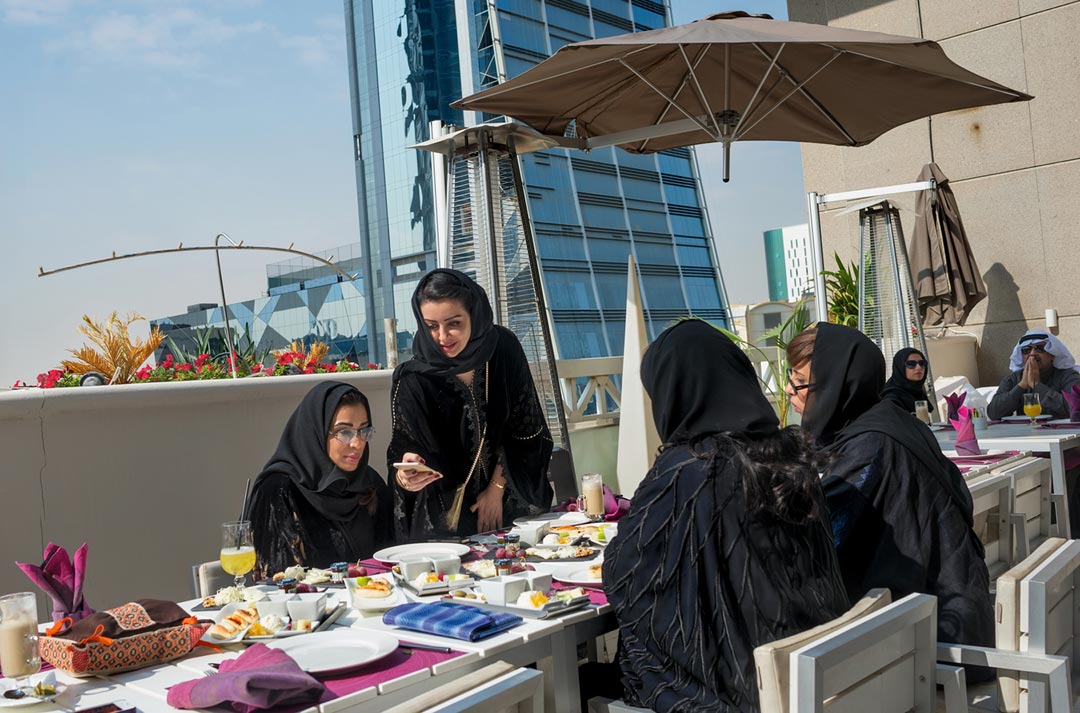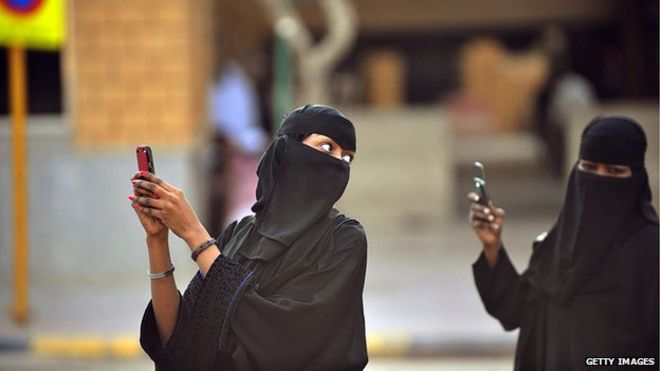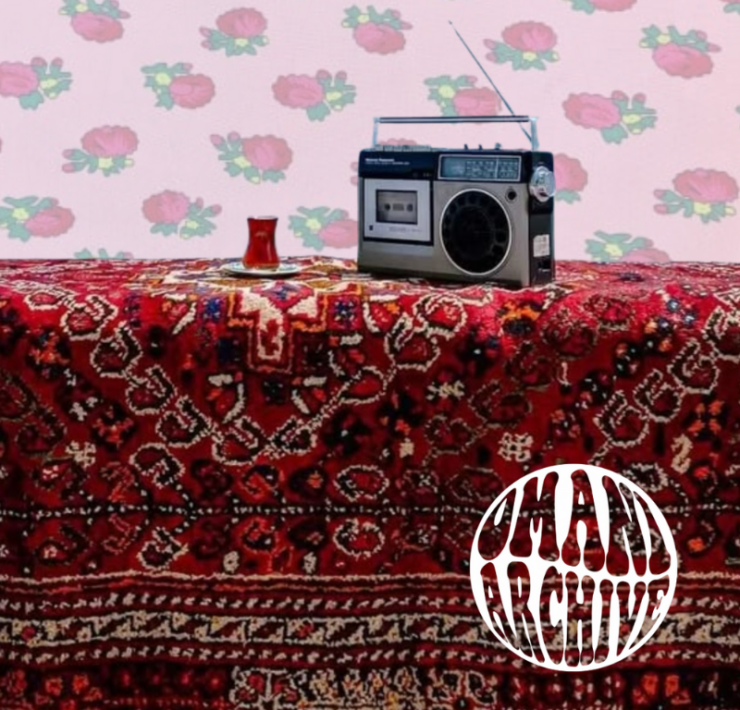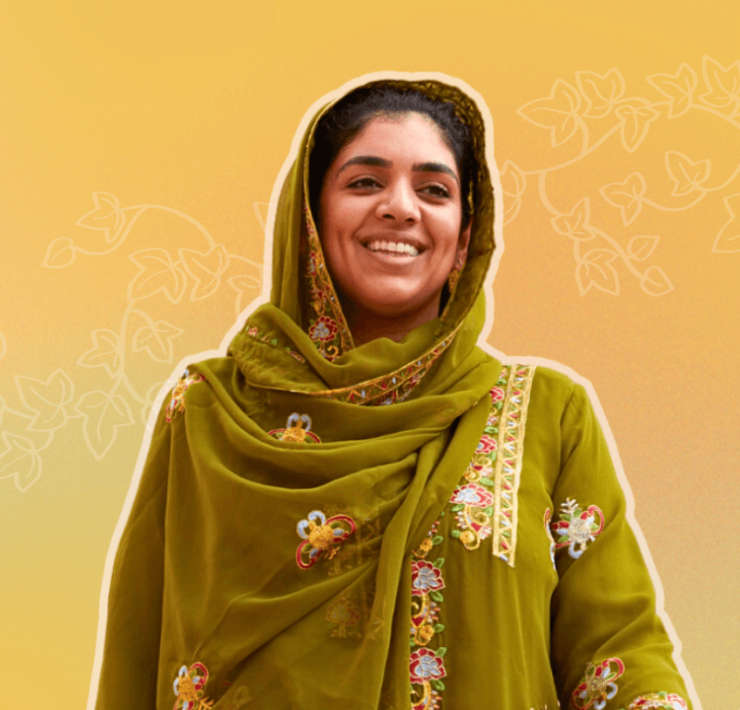Earlier this month, National Geographic released an article entitled ‘The Changing Face of Saudi Women’, celebrating the achievements of young Saudi women who are increasingly entering the work force and “redefining the boundaries of public life”. The idea of women’s empowerment in such a deeply conservative country is surely cause for celebration, but it cannot be ignored that challenges remain and meaningful social change will take time.
While some women are bravely pushing the boundaries of Saudi society and seizing their freedom and independence, an active change in Saudi politics is necessary to truly redefine the opportunities available to women in the kingdom – a change that is unlikely to take place in the near future.
 ‘Power brunch’, Saudi style (image: National Geographic)
‘Power brunch’, Saudi style (image: National Geographic)
The roots of conservatism in Saudi Arabia can be found in the political alliance that was struck in the 18th century between the House of Saud and the Wahhabi religious establishment. This alliance formed the bedrock of the Saudi state, and has provided the Saudi ruling family with religious legitimacy in exchange for allowing the Wahhabi establishment a voice in politics and society. The Wahhabi branch of Islam is deeply conservative, and, ironically, has much in common with the radical interpretations of Islam propagated by extremist groups like Al Qaeda and ISIS. It is this religious conservatism that has constituted the major obstacle for women’s empowerment in the kingdom.
Wahhabism’s influence over society and education has grown considerably since the 1980s, when the Saudi royal family tightened its links with the religious establishment in an attempt to counter criticism from religious hard-liners who claimed their rule to be illegitimate. As the NatGeo piece acknowledges, women’s rights in the kingdom took a step backwards as a result.
More recently, however, women have increasingly been encouraged into the labour market, particularly in the cities. While this seems like an incredibly positive step, it is not necessarily for the right reasons. Many have interpreted the increasing number of women in the workplace as a sign of progressive change, however this is more a result of economic practicality: in an era of austerity, the public sector needs skilled, educated workers to increase its efficiency, while ordinary families simply rely on the additional income.
 Fashion blogger Aljazi Alrakan’s Instagram (@jazzebelle) shows the stylish side of life in Saudi Arabia
Fashion blogger Aljazi Alrakan’s Instagram (@jazzebelle) shows the stylish side of life in Saudi Arabia
So are things finally changing? Perhaps superficially, but there is still a long way to go. Many have cited the role of social media in empowering women from conservative backgrounds, connecting them with their female counterparts around the world and offering them a freedom of expression that was not available to previous generations. The NatGeo article discusses the popularity of Instagram among young Saudi women like Aljazi Alrakan, a dentist and lifestyle blogger whose photos show women worldwide “that we’re living a normal life”.
But the freedom of expression via social media like Instagram is only disproportionately available to women in the kingdom. Many women, including those from comparatively liberal backgrounds, keep their online accounts secret and anonymous for fear of their being discovered by more conservative relatives or members of their community.
 “Sometimes we’re in the 21st century, and sometimes we’re in the 19th.” (image: GettyImages)
“Sometimes we’re in the 21st century, and sometimes we’re in the 19th.” (image: GettyImages)
The proliferation of the Internet and social media has created a bizarre clash in the kingdom between modernity and backwardness. While it does provide the opportunity for women to express themselves, they still face a huge amount of resistance from Saudi society – with as much of this resistance coming from other women as from men. Celebrated hobbies and interests like blogging, fashion and fitness are also not necessarily accessible to all. The NatGeo article follows a group of “Saudi women of means” enjoying a fashion show. This fleeting reference highlights the role of social status and wealth in determining the opportunities available to women in terms of both work and leisure. It is also worth noting, given that such activities are largely enjoyed in urban metropolises like Riyadh and Jeddah, that liberal, “city women” represent only a very small proportion of the population.
There is cause for optimism, however: social change in Saudi Arabia is happening at a much quicker pace than it ever happened in Europe, as the NatGeo piece proudly states. The women celebrated in the article might not be making legal or structural changes, but they are opening the minds of Saudis by showing their confidence, and showing the world that, while their society might be considered “backward”, they certainly are not.
 Women’s fitness has taken off in the kingdom, especially in the less conservative port-city of Jeddah (image: Instagram @flagboxing)
Women’s fitness has taken off in the kingdom, especially in the less conservative port-city of Jeddah (image: Instagram @flagboxing)
But it is important to remember that Saudi Arabia has not always been as conservative as it is today, which highlights the role of politics in “deeply rooted” Saudi conservatism. Changing the hearts and minds of Saudis, one by one, will take many years. In order for social change to permeate every level of society, the government must reign in the religious establishment’s influence over politics and society – particularly education.
This is unlikely to happen any time soon. The Saudi regime is facing declining revenues and ever-increasing financial obligations created by its bloated, and constantly expanding bureaucracy. The House of Saud is also attracting criticism and resistance from groups like ISIS, who call the ruling family ‘apostate’ and illegitimate. In the face of such challenges, the government is likely to tighten its links with the religious establishment, upon which it relies for support and legitimacy. Unfortunately, this is counterproductive not only socially, but also for politics and the economy, in which the participation of women would only make the country stronger in the face of instability.
But we must still give these women credit for their resilience in the face of social pressure and their remarkable contributions to Saudi culture. Hearts and minds will follow, insha’allah.






